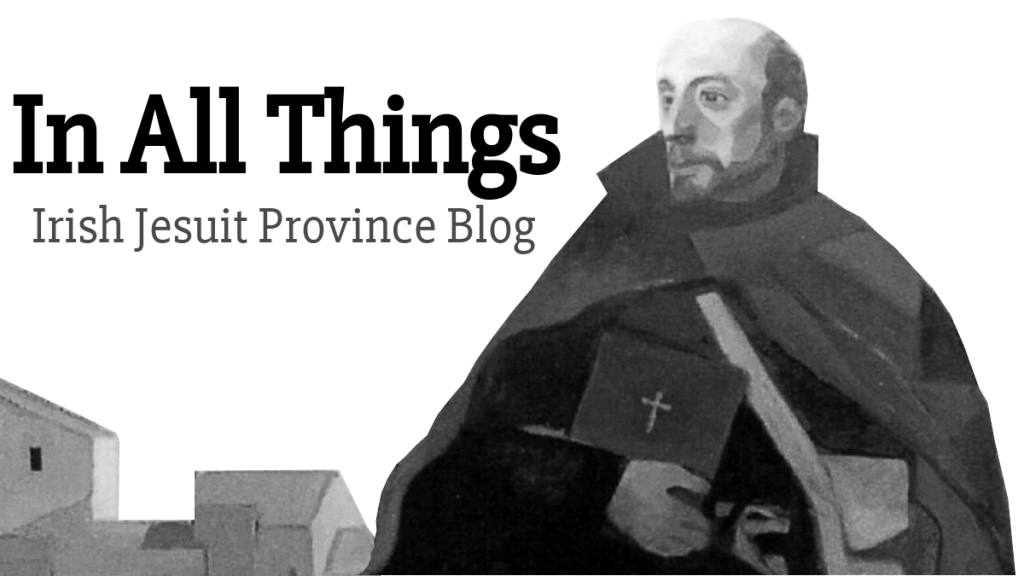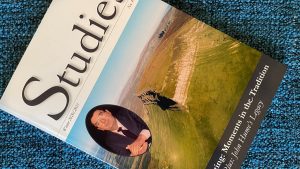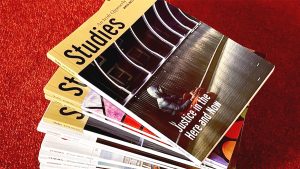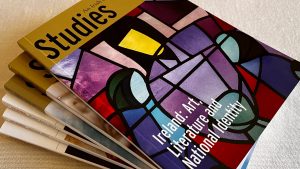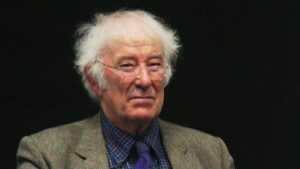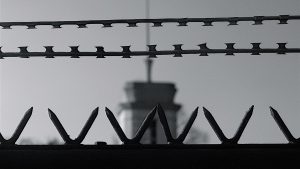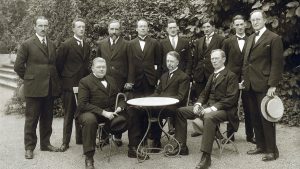Ireland’s missed opportunity

JOHN BIRD [STUDIES] :: George Russell, also known by his pen name AE, was a significant contributor to the nationalist cultural revival and at the centre of the artists and thinkers behind the nationalist movement. This piece from Studies in 1923 shows the horror he felt at the destruction wrought by the civil war. In it he accuses ‘the champions of physical force’ of having ‘poisoned the soul of Ireland’. ‘All that was exquisite and lovable is dying,’ he adds: ‘They have squandered a spirit created by poets, scholars and patriots of a different order’.
Although at the time of the Rising he had been in support of it, AE had not joined in the combat, on account of his pacifism. Writing in 1923, he looks back to the violent insurrection with disdain.
The Irish revolution, which began in Easter Week, has also triumphed solely in externals. Our spiritual, cultural, and intellectual life has not changed for the better. If anything, it has retrograded. Nothing beautiful in the mind has found freer development. In so far as anything is done efficiently, it is done by administrators, educationists, officials and guiders of industry, who maintain, so far as permitted by circumstances, the habits engendered before the war for independence. The Anglicization of the Irish mind remains unaffected. The Gaelic movement was the one movement in Ireland with a truly national character. It began its work in the soul, not on the body. It inspired a few heroes to fight; but the transfer of energy to the plane of physical conflict weakened it; and now, when there is theoretical possibility of a Gaelic state, there are not Gaels in numbers and intellect competent to take control. The mass of people in the country continue to think as they did before the revolution.
He makes the point that cultural and spiritual advances of a nation can only be fostered in peace and argues that the lack of celebration upon the advent of the Free State was down to war weariness.
Inevitably also, after a victory brought about by the wreckage of the economic life of the people, the preoccupation of all with the work of material reconstruction would thrust all spiritual and cultural ideals out of sight. It would give people a sense of nausea to have them discussed. The moods by which high spiritual, political or cultural ideals are appreciated are engendered in times of peace. The Free State came into being with popular feeling stagnant. Why was this? Seven years of sensation had dulled the heart and made it insensitive. If a Republic were proclaimed in Ireland next year or the year after, would there be any more exultation? I think not. Another year or two of civil conflict and the heart would have been unhappy so long that it would have become fixed in sadness. The citizens would gaze with the same apathetic dullness on Republican deputies going to Dail meetings that they now display when deputies attend the Free State assembly.
…Our over-long employment of physical force has prohibited the spiritual genius from manifestation among the people. It has almost become atrophied from disuse. The triumph of spiritual or cultural ideals cannot be brought about by physical force, but only by labours of the imagination and intellect.
AE concludes the essay with a warning of how easily the culture of a nation can be dissipated or completely lost through violence and war. There is a realism behind this argument. Irish nationality was not an ideal that existed outside our struggles as some transcendent ideal. It is something that had been toiled for and built through the labour of the people.
We can establish Irish nationality only by building in the heart and the imagination. When we fight we level life to that of the primitive savage, before the imagination had built up the high poetry, arts, architecture and sciences which make civilisation and distinguish race from race. We extinguish national characteristics, for there is no difference between killers in any country. They are all beasts for the time being – Russians, Germans, French, English, Irish – all the same. It is easy for a nation to break with its past in a few tragic years. The Great Famine made such a break in Irish life. The heart was too dead to grow its flowers, and beautiful traditions and customs withered with human life out of memory. The civil conflict which is devastating Ireland, if it does not end speedily, will part us from what was saved of lovable national life and character. In the Apocalypse a spirit blows a trumpet, and a third part of life perishes. Another trumpet is blown, and the waters of life turn bitter and men die because of the bitterness. These images might stand for the tragedy which is past and for the tragedy which is to come.
I cannot understand the faith of those who act on the belief that a nation is immortal and can survive any strain. Nations are no more immortal than individuals. The dust of the desert is over great cities whose inhabitants loved their country with no less a passion than Irish nationalists have loved theirs. Earth is dense with traditions of perished nationalities. If a nation is like a dissolute youth who impairs his vitality by excesses, it will perish as surely and by as inexorable a law of life as the debauchee. There comes a point where recovery is impossible. Something – a skeleton or larva – may survive, but not the nation with confident genius. There will always be herdsmen to look after the bullocks; but the genius of the Gael, if this conflict continues for much longer, will have vanished from its place of birth. The curious in psychology may seek to trace a flash of character here and there in some state of the new world to a possible Gaelic ancestry –
“a phrase,
As in wild earth a Grecian vase.”
AE’s disillusionment with the Irish Free State led him to abandon Ireland in 1933, the year after the death of his wife, first for London and then for a lecture tour in the United States. He had to cut his tour short on account of illness, and when he returned to London he was diagnosed with cancer. He died on 17 July 1935. His body was returned to Ireland, and he was buried in Mount Jerome cemetery, Dublin.
Sources
AE, ‘Lessons of Revolution’, in Studies: An Irish Historical Review (March, 1923), pages 1-6.
Dictionary of Irish Biography, Russell, George William (AE): https://www.dib.ie/biography/russell-george-william-ae-a7836


